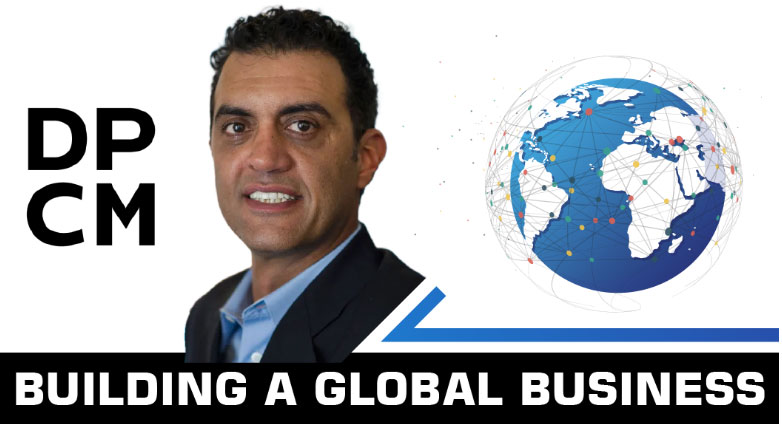Tech Leader Emil Michael on Building a Global Business

What’s bigger than a million dollar idea? Building a business that consumers the world over can depend on. How does one do that? “If you have a product that works, people all over the world are going to want to use it,” says Emil Michael. Simple, straightforward words of wisdom from the Egyptian-born businessman.
“When you find that out, the only thing that limits your growth is how fast you can launch and how you ingrain yourself into that city or community,” he notes. Since 2020 Michael has been the CEO of DPCM Capital Inc., which is based in Miami. Before that, he established Uber as a thriving global business at the intersection of transportation and technology.
After joining Uber in 2013, Emil Michael filled various roles, from raising money and partnerships to high-end government relations. He learned many valuable business lessons as the external face of Uber — the one who interacted with partners and customers worldwide. “The nexus between business and government is tight, and that is particularly true in lots of other countries in Asia where the business community and the government community are tightly bound together,” explains Michael.
“So how you influence the government to have regulations that support you kind of often comes from business.” Helping Uber grow into the transportation juggernaut that it is today was “the wildest ride I have ever been on,” admits Michael.
Emil Michael Equates Building a Business to Creating a Civilization
“When you are building a big company, in some ways you are building a civilization,” Michael explains. What he means is, “It has got to take into account all kinds of factors that you wouldn’t think about as a scrappy startup,” shares Michael. However, he has always embraced the responsibility and notes that it is vital for a company to do right by the community. Giving rides to those with handicaps, serving historically underserved areas, and helping reduce DUIs by providing individuals an alternative to getting behind the wheel of their own vehicle are a few of the ways that ride-sharing companies have been doing their civic duties for the past decade-plus.
Market and Global Expansion
Uber first operated in San Francisco for nearly a year before expanding to New York City. “We were only in two markets until we perfected how to operationally do this,” Michael recalls. “After we got the first 12 cities or so, one on every continent, we opened the floodgates.”
For companies looking to expand in China, Michael advises, “You have got to be prepared for China — competitiveness is fierce there. And all kinds of tactics that we wouldn’t use [in the United States] are used there, so you have to be resilient enough to withstand them.”
Emil Michael Talks Company Culture
“Culturally, being in every single time zone means that you need a 24/7 operation, and culturally that means your hair feels like it is on fire a lot,” explains Michael. He stresses the importance of having a workplace culture that is resilient. “It needs to be able to take the constant new developments that are happening, whether it is a regulatory development, or it could be an accident, could be an opportunity or competitors raising money, there are lots of things that can happen in all corners of the globe,” he says.
The Challenges of Hiring Staff Around the World
“There comes a time when you can’t personally hire everyone on your staff, and you can’t interview every single person that joins your group,” says Emil Michael. That commonly occurs when a business has reached at least 50 employees. “It’s hard because they are far-flung, and you need to trust other people to do the hiring and to carry your cultural values outward to those people and make sure that even though they may be in an outpost in Nigeria, they [will continue] to reflect the company’s values, in addition to absorbing the local market as well,” says Michael. “It’s a real challenge, but it was probably the thing I loved doing the most at Uber.”
To succeed in business, Michael says a person must become part of the fabric of the city or country they are working in. “That means taking more of a responsibility for acting like a good citizen,” he says.
Emil Michael on Maintaining an Underdog Mentality
Whether you are working on building a scrappy startup or running a famous Fortune 500 company, Michael stresses the importance of maintaining a motivated, underdog mentality. “We had the underdog mentality everywhere in the company,” Emil Michael says of his time at Uber, where every city in the United States as well as globally operates as its startup.
“Each city functions as its own business unit with its own CEO, if you will. They have their own PNL [profit and loss] and do their own hiring and all that, so you really push out a lot of autonomy to the field,” he explains. “That is important because regulations around transportation are typically decided at the local level.” He stresses the importance of the entrepreneurial spirit. “You have to have those people be entrepreneurial, and they absolutely still feel like underdogs,” he notes.
In regards to partnerships, Michael says it depends on the nature of the business. “I’m biased, so even if you have just a tech business, I say you have to be out there building relationships because someday you will need partnerships to accelerate the business, or take in new territories, or to do [mergers and acquisitions],” he says.
Emil Michael: Ride-Sharing Offers Relief for Overcrowded Public Transportation Worldwide
“Most public transportation infrastructures are a little overwhelmed right now,” notes Michael. “[Ride-sharing] is like a stress valve or release valve for that. So what has gotten interesting is some of the more forward-thinking mayors have said, ‘This is actually great’ [since] ridesharing like Uber can reduce congestion without having to build new infrastructure.”
According to Emil Michael, “Developing-world trends are different than developed-world trends.” He cites San Francisco as an example. “San Francisco isn’t building new subways, and the buses are packed — everything is packed — so if I can reduce congestion, because my cars do not circle for parking and waste 30% on fuel, and they are carrying multiple people, then I am sort of adding to the infrastructure of the city,” explains Michael.
Have you read?
When It Comes to Business During Chaos, Only the Resilient Survive by Rhett Power.
Entrepreneur Trevor Edwards: How Collaboration Leads to Success.
Everything You Need to Know About Adrien Rappoport.
CEO Spotlight: Lightricks CEO Zeev Farbman on the Evolution of the Creator Economy.
6 Ways to Prevent Fraud in Your Company.
Add CEOWORLD magazine to your Google News feed.
Follow CEOWORLD magazine headlines on: Google News, LinkedIn, Twitter, and Facebook.
Copyright 2024 The CEOWORLD magazine. All rights reserved. This material (and any extract from it) must not be copied, redistributed or placed on any website, without CEOWORLD magazine' prior written consent. For media queries, please contact: info@ceoworld.biz








